Analysis and Usage of Expert Systems
VerifiedAdded on 2022/08/29
|11
|2310
|17
AI Summary
Contribute Materials
Your contribution can guide someone’s learning journey. Share your
documents today.
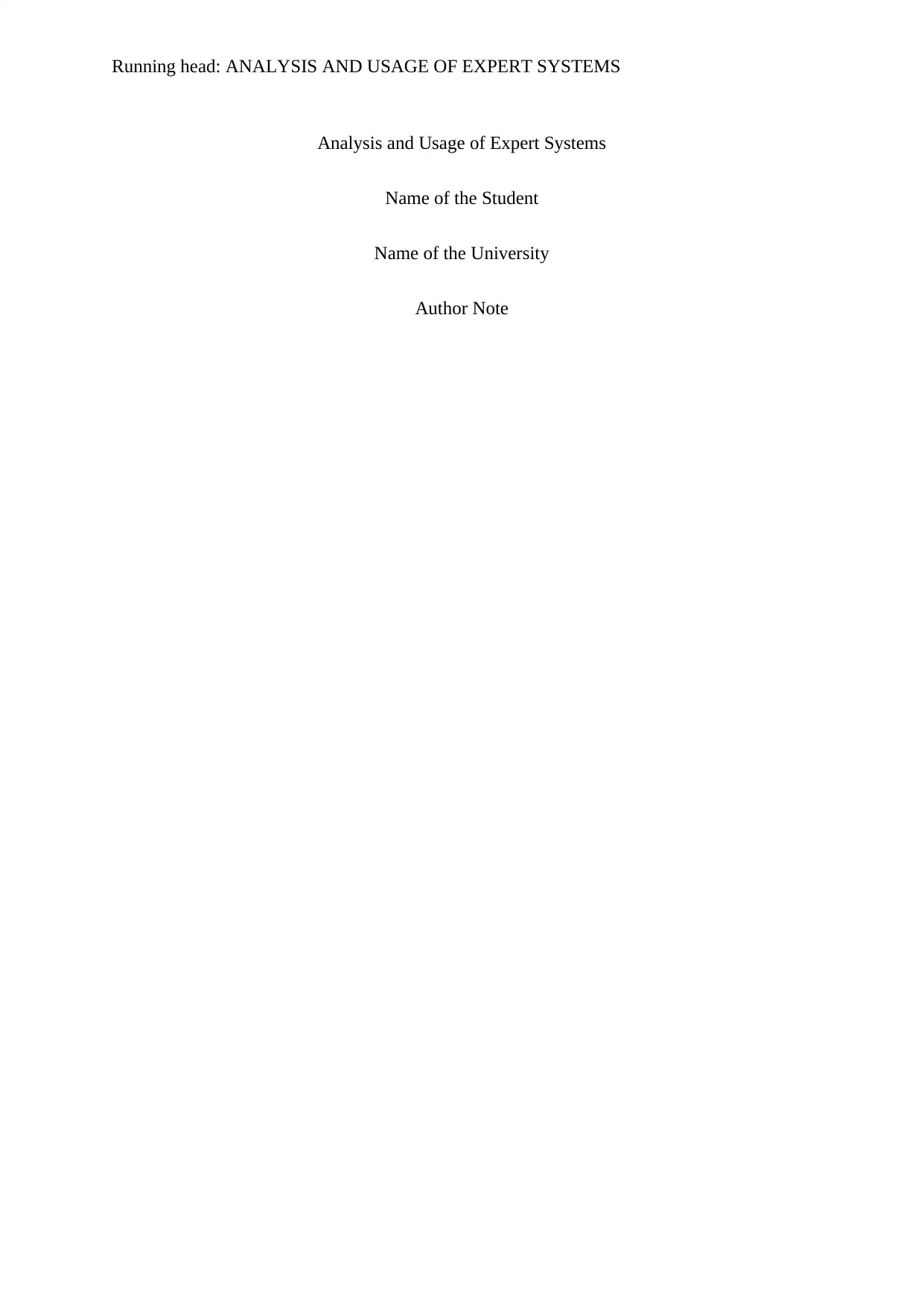
Running head: ANALYSIS AND USAGE OF EXPERT SYSTEMS
Analysis and Usage of Expert Systems
Name of the Student
Name of the University
Author Note
Analysis and Usage of Expert Systems
Name of the Student
Name of the University
Author Note
Secure Best Marks with AI Grader
Need help grading? Try our AI Grader for instant feedback on your assignments.
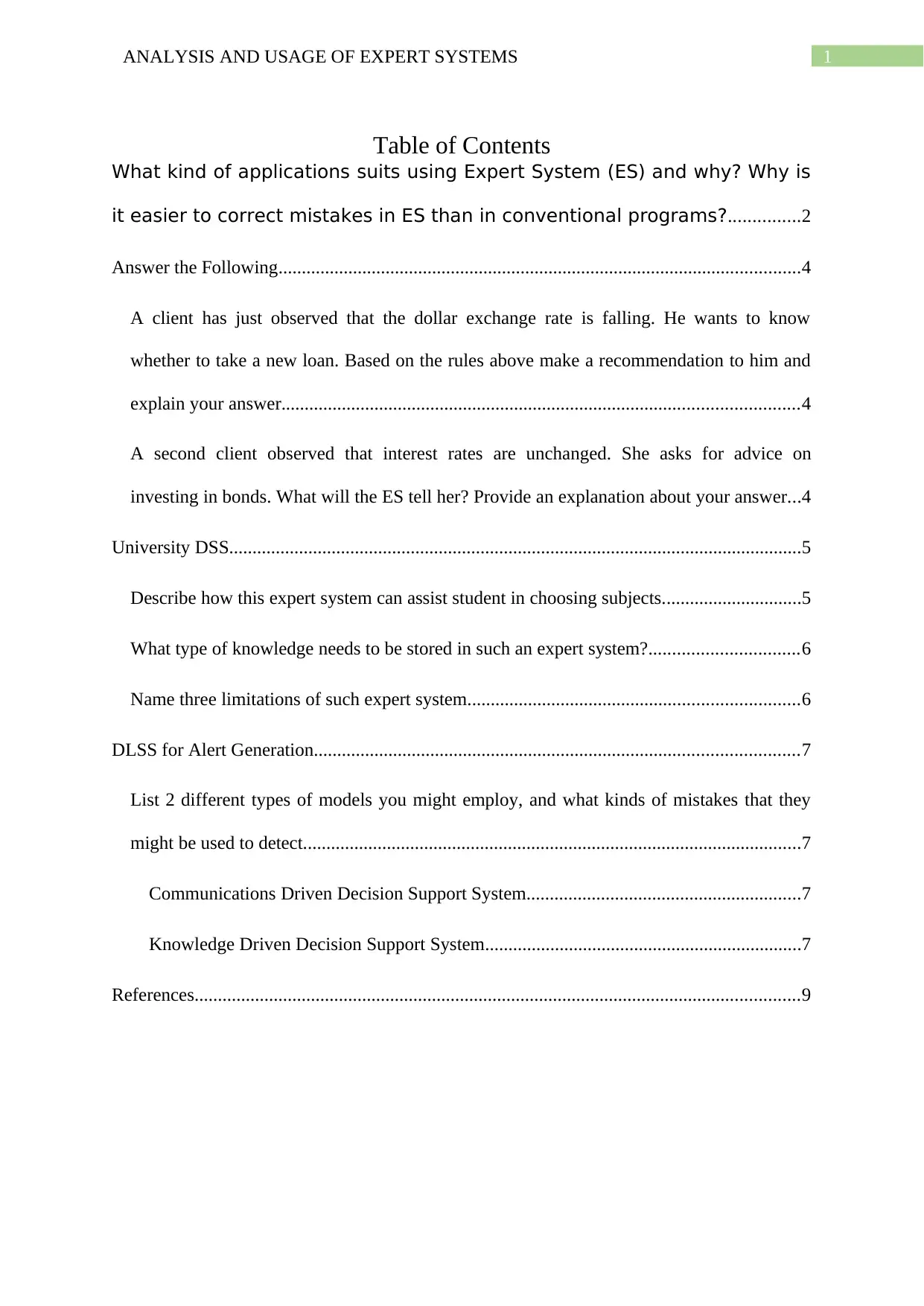
1ANALYSIS AND USAGE OF EXPERT SYSTEMS
Table of Contents
What kind of applications suits using Expert System (ES) and why? Why is
it easier to correct mistakes in ES than in conventional programs?...............2
Answer the Following................................................................................................................4
A client has just observed that the dollar exchange rate is falling. He wants to know
whether to take a new loan. Based on the rules above make a recommendation to him and
explain your answer...............................................................................................................4
A second client observed that interest rates are unchanged. She asks for advice on
investing in bonds. What will the ES tell her? Provide an explanation about your answer...4
University DSS...........................................................................................................................5
Describe how this expert system can assist student in choosing subjects..............................5
What type of knowledge needs to be stored in such an expert system?................................6
Name three limitations of such expert system.......................................................................6
DLSS for Alert Generation........................................................................................................7
List 2 different types of models you might employ, and what kinds of mistakes that they
might be used to detect...........................................................................................................7
Communications Driven Decision Support System...........................................................7
Knowledge Driven Decision Support System....................................................................7
References..................................................................................................................................9
Table of Contents
What kind of applications suits using Expert System (ES) and why? Why is
it easier to correct mistakes in ES than in conventional programs?...............2
Answer the Following................................................................................................................4
A client has just observed that the dollar exchange rate is falling. He wants to know
whether to take a new loan. Based on the rules above make a recommendation to him and
explain your answer...............................................................................................................4
A second client observed that interest rates are unchanged. She asks for advice on
investing in bonds. What will the ES tell her? Provide an explanation about your answer...4
University DSS...........................................................................................................................5
Describe how this expert system can assist student in choosing subjects..............................5
What type of knowledge needs to be stored in such an expert system?................................6
Name three limitations of such expert system.......................................................................6
DLSS for Alert Generation........................................................................................................7
List 2 different types of models you might employ, and what kinds of mistakes that they
might be used to detect...........................................................................................................7
Communications Driven Decision Support System...........................................................7
Knowledge Driven Decision Support System....................................................................7
References..................................................................................................................................9
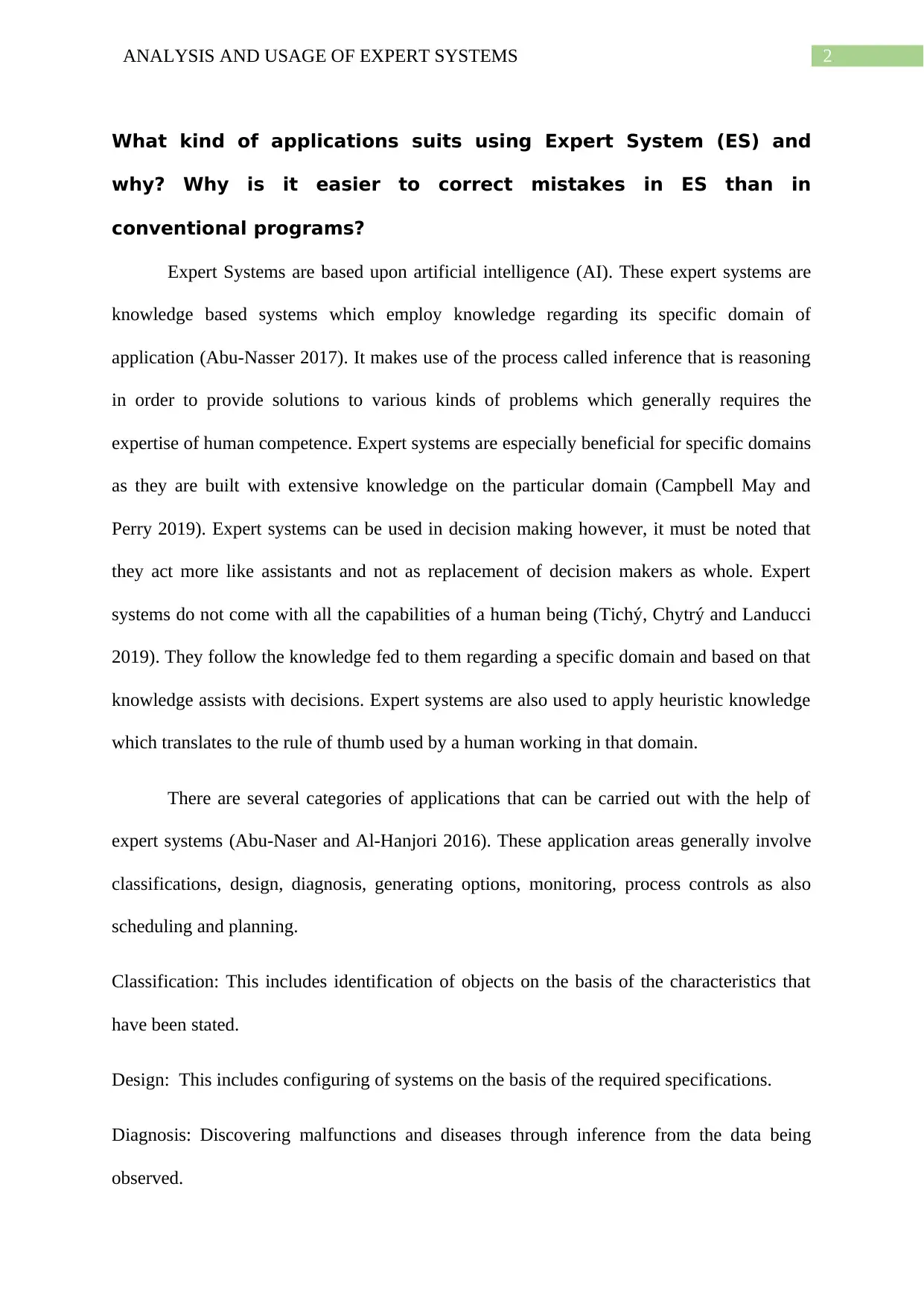
2ANALYSIS AND USAGE OF EXPERT SYSTEMS
What kind of applications suits using Expert System (ES) and
why? Why is it easier to correct mistakes in ES than in
conventional programs?
Expert Systems are based upon artificial intelligence (AI). These expert systems are
knowledge based systems which employ knowledge regarding its specific domain of
application (Abu-Nasser 2017). It makes use of the process called inference that is reasoning
in order to provide solutions to various kinds of problems which generally requires the
expertise of human competence. Expert systems are especially beneficial for specific domains
as they are built with extensive knowledge on the particular domain (Campbell May and
Perry 2019). Expert systems can be used in decision making however, it must be noted that
they act more like assistants and not as replacement of decision makers as whole. Expert
systems do not come with all the capabilities of a human being (Tichý, Chytrý and Landucci
2019). They follow the knowledge fed to them regarding a specific domain and based on that
knowledge assists with decisions. Expert systems are also used to apply heuristic knowledge
which translates to the rule of thumb used by a human working in that domain.
There are several categories of applications that can be carried out with the help of
expert systems (Abu-Naser and Al-Hanjori 2016). These application areas generally involve
classifications, design, diagnosis, generating options, monitoring, process controls as also
scheduling and planning.
Classification: This includes identification of objects on the basis of the characteristics that
have been stated.
Design: This includes configuring of systems on the basis of the required specifications.
Diagnosis: Discovering malfunctions and diseases through inference from the data being
observed.
What kind of applications suits using Expert System (ES) and
why? Why is it easier to correct mistakes in ES than in
conventional programs?
Expert Systems are based upon artificial intelligence (AI). These expert systems are
knowledge based systems which employ knowledge regarding its specific domain of
application (Abu-Nasser 2017). It makes use of the process called inference that is reasoning
in order to provide solutions to various kinds of problems which generally requires the
expertise of human competence. Expert systems are especially beneficial for specific domains
as they are built with extensive knowledge on the particular domain (Campbell May and
Perry 2019). Expert systems can be used in decision making however, it must be noted that
they act more like assistants and not as replacement of decision makers as whole. Expert
systems do not come with all the capabilities of a human being (Tichý, Chytrý and Landucci
2019). They follow the knowledge fed to them regarding a specific domain and based on that
knowledge assists with decisions. Expert systems are also used to apply heuristic knowledge
which translates to the rule of thumb used by a human working in that domain.
There are several categories of applications that can be carried out with the help of
expert systems (Abu-Naser and Al-Hanjori 2016). These application areas generally involve
classifications, design, diagnosis, generating options, monitoring, process controls as also
scheduling and planning.
Classification: This includes identification of objects on the basis of the characteristics that
have been stated.
Design: This includes configuring of systems on the basis of the required specifications.
Diagnosis: Discovering malfunctions and diseases through inference from the data being
observed.
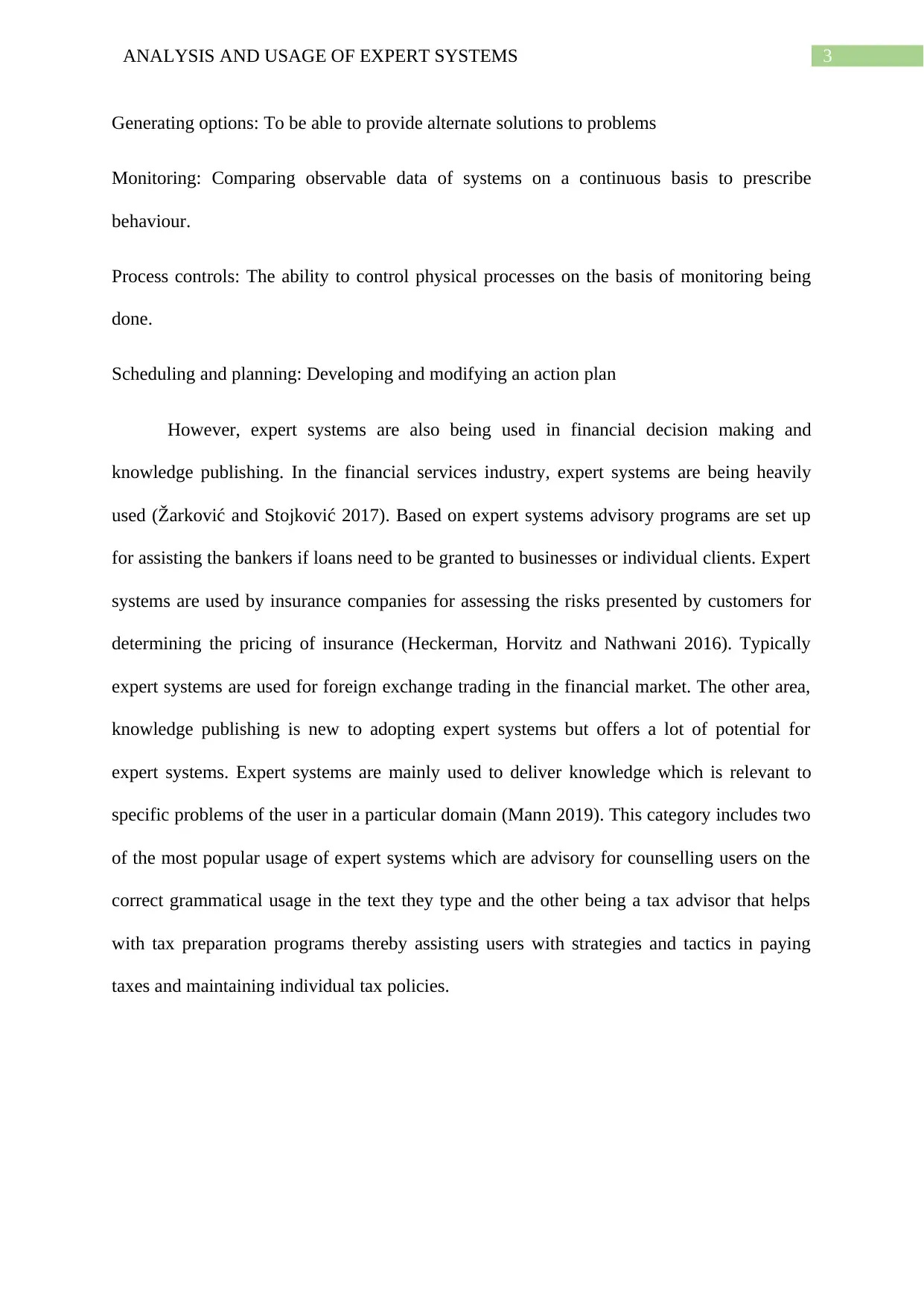
3ANALYSIS AND USAGE OF EXPERT SYSTEMS
Generating options: To be able to provide alternate solutions to problems
Monitoring: Comparing observable data of systems on a continuous basis to prescribe
behaviour.
Process controls: The ability to control physical processes on the basis of monitoring being
done.
Scheduling and planning: Developing and modifying an action plan
However, expert systems are also being used in financial decision making and
knowledge publishing. In the financial services industry, expert systems are being heavily
used (Žarković and Stojković 2017). Based on expert systems advisory programs are set up
for assisting the bankers if loans need to be granted to businesses or individual clients. Expert
systems are used by insurance companies for assessing the risks presented by customers for
determining the pricing of insurance (Heckerman, Horvitz and Nathwani 2016). Typically
expert systems are used for foreign exchange trading in the financial market. The other area,
knowledge publishing is new to adopting expert systems but offers a lot of potential for
expert systems. Expert systems are mainly used to deliver knowledge which is relevant to
specific problems of the user in a particular domain (Mann 2019). This category includes two
of the most popular usage of expert systems which are advisory for counselling users on the
correct grammatical usage in the text they type and the other being a tax advisor that helps
with tax preparation programs thereby assisting users with strategies and tactics in paying
taxes and maintaining individual tax policies.
Generating options: To be able to provide alternate solutions to problems
Monitoring: Comparing observable data of systems on a continuous basis to prescribe
behaviour.
Process controls: The ability to control physical processes on the basis of monitoring being
done.
Scheduling and planning: Developing and modifying an action plan
However, expert systems are also being used in financial decision making and
knowledge publishing. In the financial services industry, expert systems are being heavily
used (Žarković and Stojković 2017). Based on expert systems advisory programs are set up
for assisting the bankers if loans need to be granted to businesses or individual clients. Expert
systems are used by insurance companies for assessing the risks presented by customers for
determining the pricing of insurance (Heckerman, Horvitz and Nathwani 2016). Typically
expert systems are used for foreign exchange trading in the financial market. The other area,
knowledge publishing is new to adopting expert systems but offers a lot of potential for
expert systems. Expert systems are mainly used to deliver knowledge which is relevant to
specific problems of the user in a particular domain (Mann 2019). This category includes two
of the most popular usage of expert systems which are advisory for counselling users on the
correct grammatical usage in the text they type and the other being a tax advisor that helps
with tax preparation programs thereby assisting users with strategies and tactics in paying
taxes and maintaining individual tax policies.
Secure Best Marks with AI Grader
Need help grading? Try our AI Grader for instant feedback on your assignments.
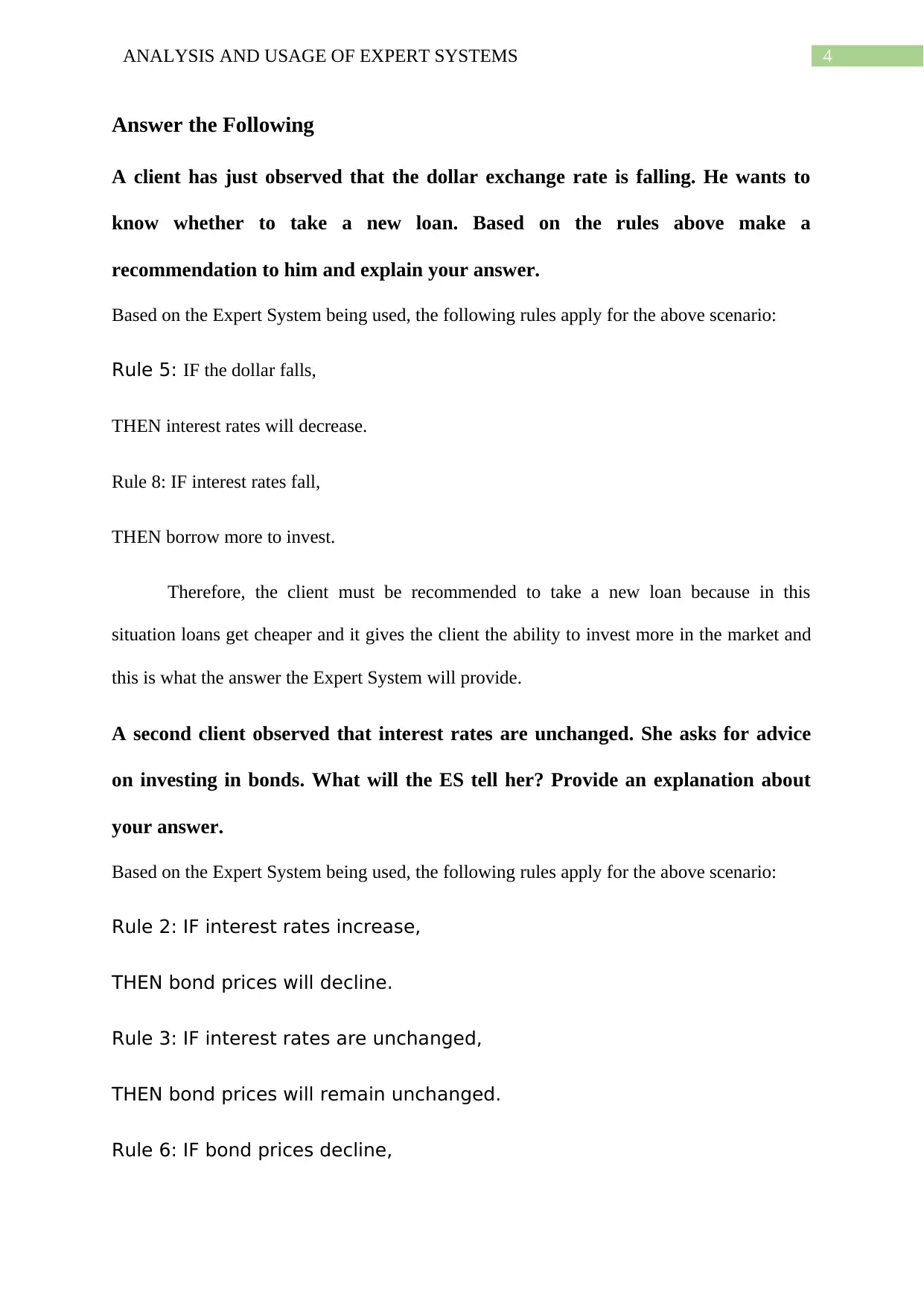
4ANALYSIS AND USAGE OF EXPERT SYSTEMS
Answer the Following
A client has just observed that the dollar exchange rate is falling. He wants to
know whether to take a new loan. Based on the rules above make a
recommendation to him and explain your answer.
Based on the Expert System being used, the following rules apply for the above scenario:
Rule 5: IF the dollar falls,
THEN interest rates will decrease.
Rule 8: IF interest rates fall,
THEN borrow more to invest.
Therefore, the client must be recommended to take a new loan because in this
situation loans get cheaper and it gives the client the ability to invest more in the market and
this is what the answer the Expert System will provide.
A second client observed that interest rates are unchanged. She asks for advice
on investing in bonds. What will the ES tell her? Provide an explanation about
your answer.
Based on the Expert System being used, the following rules apply for the above scenario:
Rule 2: IF interest rates increase,
THEN bond prices will decline.
Rule 3: IF interest rates are unchanged,
THEN bond prices will remain unchanged.
Rule 6: IF bond prices decline,
Answer the Following
A client has just observed that the dollar exchange rate is falling. He wants to
know whether to take a new loan. Based on the rules above make a
recommendation to him and explain your answer.
Based on the Expert System being used, the following rules apply for the above scenario:
Rule 5: IF the dollar falls,
THEN interest rates will decrease.
Rule 8: IF interest rates fall,
THEN borrow more to invest.
Therefore, the client must be recommended to take a new loan because in this
situation loans get cheaper and it gives the client the ability to invest more in the market and
this is what the answer the Expert System will provide.
A second client observed that interest rates are unchanged. She asks for advice
on investing in bonds. What will the ES tell her? Provide an explanation about
your answer.
Based on the Expert System being used, the following rules apply for the above scenario:
Rule 2: IF interest rates increase,
THEN bond prices will decline.
Rule 3: IF interest rates are unchanged,
THEN bond prices will remain unchanged.
Rule 6: IF bond prices decline,
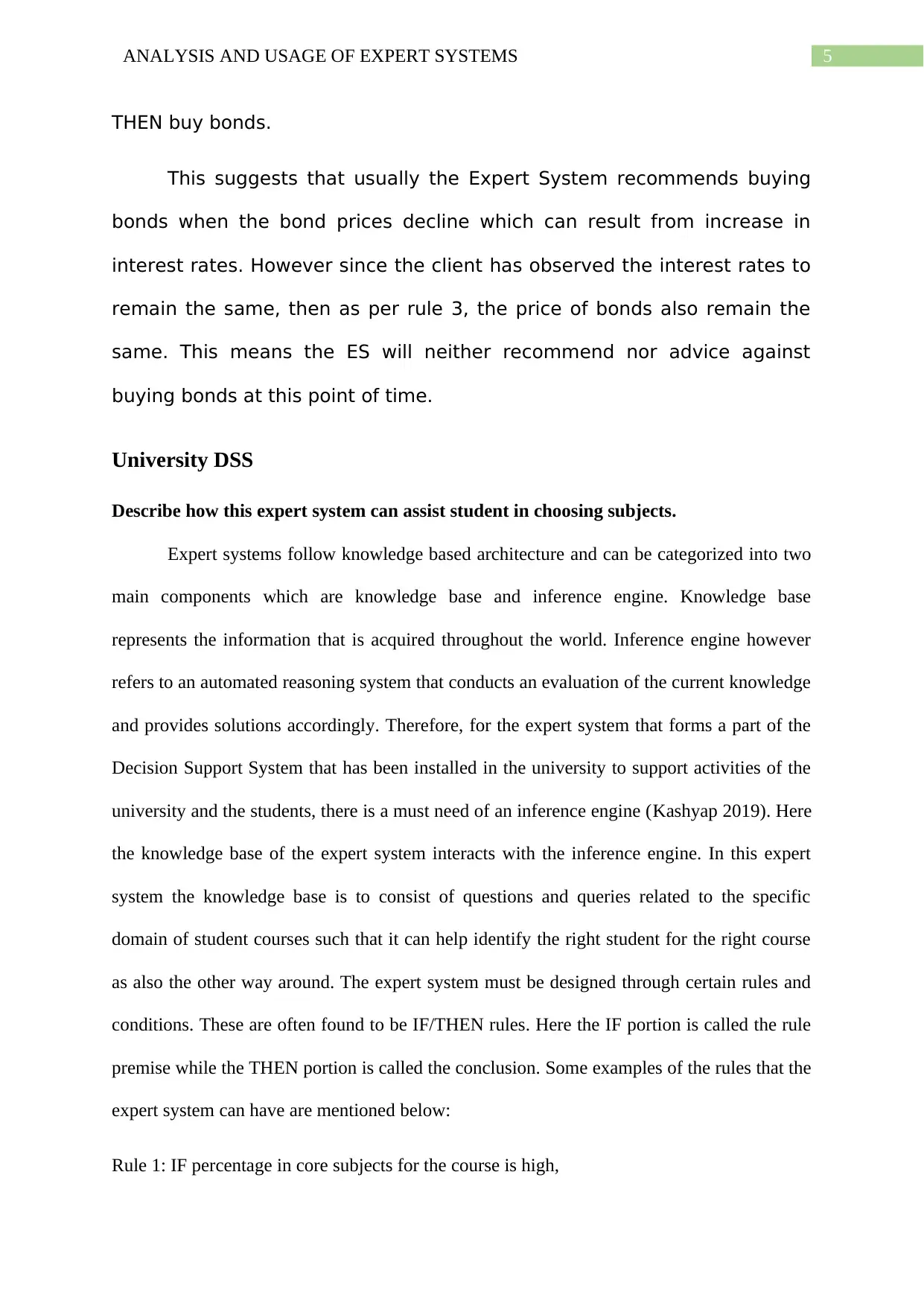
5ANALYSIS AND USAGE OF EXPERT SYSTEMS
THEN buy bonds.
This suggests that usually the Expert System recommends buying
bonds when the bond prices decline which can result from increase in
interest rates. However since the client has observed the interest rates to
remain the same, then as per rule 3, the price of bonds also remain the
same. This means the ES will neither recommend nor advice against
buying bonds at this point of time.
University DSS
Describe how this expert system can assist student in choosing subjects.
Expert systems follow knowledge based architecture and can be categorized into two
main components which are knowledge base and inference engine. Knowledge base
represents the information that is acquired throughout the world. Inference engine however
refers to an automated reasoning system that conducts an evaluation of the current knowledge
and provides solutions accordingly. Therefore, for the expert system that forms a part of the
Decision Support System that has been installed in the university to support activities of the
university and the students, there is a must need of an inference engine (Kashyap 2019). Here
the knowledge base of the expert system interacts with the inference engine. In this expert
system the knowledge base is to consist of questions and queries related to the specific
domain of student courses such that it can help identify the right student for the right course
as also the other way around. The expert system must be designed through certain rules and
conditions. These are often found to be IF/THEN rules. Here the IF portion is called the rule
premise while the THEN portion is called the conclusion. Some examples of the rules that the
expert system can have are mentioned below:
Rule 1: IF percentage in core subjects for the course is high,
THEN buy bonds.
This suggests that usually the Expert System recommends buying
bonds when the bond prices decline which can result from increase in
interest rates. However since the client has observed the interest rates to
remain the same, then as per rule 3, the price of bonds also remain the
same. This means the ES will neither recommend nor advice against
buying bonds at this point of time.
University DSS
Describe how this expert system can assist student in choosing subjects.
Expert systems follow knowledge based architecture and can be categorized into two
main components which are knowledge base and inference engine. Knowledge base
represents the information that is acquired throughout the world. Inference engine however
refers to an automated reasoning system that conducts an evaluation of the current knowledge
and provides solutions accordingly. Therefore, for the expert system that forms a part of the
Decision Support System that has been installed in the university to support activities of the
university and the students, there is a must need of an inference engine (Kashyap 2019). Here
the knowledge base of the expert system interacts with the inference engine. In this expert
system the knowledge base is to consist of questions and queries related to the specific
domain of student courses such that it can help identify the right student for the right course
as also the other way around. The expert system must be designed through certain rules and
conditions. These are often found to be IF/THEN rules. Here the IF portion is called the rule
premise while the THEN portion is called the conclusion. Some examples of the rules that the
expert system can have are mentioned below:
Rule 1: IF percentage in core subjects for the course is high,
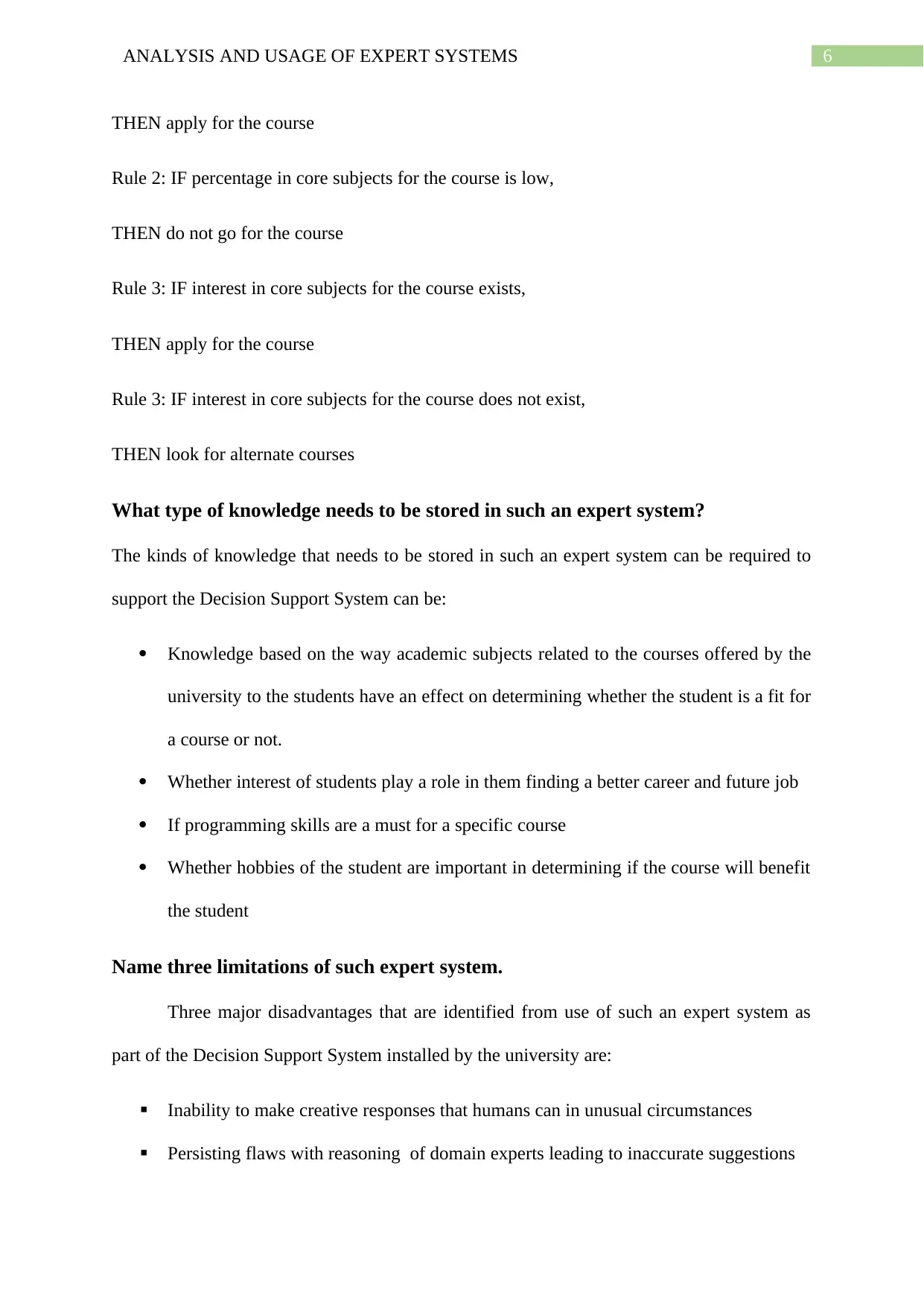
6ANALYSIS AND USAGE OF EXPERT SYSTEMS
THEN apply for the course
Rule 2: IF percentage in core subjects for the course is low,
THEN do not go for the course
Rule 3: IF interest in core subjects for the course exists,
THEN apply for the course
Rule 3: IF interest in core subjects for the course does not exist,
THEN look for alternate courses
What type of knowledge needs to be stored in such an expert system?
The kinds of knowledge that needs to be stored in such an expert system can be required to
support the Decision Support System can be:
Knowledge based on the way academic subjects related to the courses offered by the
university to the students have an effect on determining whether the student is a fit for
a course or not.
Whether interest of students play a role in them finding a better career and future job
If programming skills are a must for a specific course
Whether hobbies of the student are important in determining if the course will benefit
the student
Name three limitations of such expert system.
Three major disadvantages that are identified from use of such an expert system as
part of the Decision Support System installed by the university are:
Inability to make creative responses that humans can in unusual circumstances
Persisting flaws with reasoning of domain experts leading to inaccurate suggestions
THEN apply for the course
Rule 2: IF percentage in core subjects for the course is low,
THEN do not go for the course
Rule 3: IF interest in core subjects for the course exists,
THEN apply for the course
Rule 3: IF interest in core subjects for the course does not exist,
THEN look for alternate courses
What type of knowledge needs to be stored in such an expert system?
The kinds of knowledge that needs to be stored in such an expert system can be required to
support the Decision Support System can be:
Knowledge based on the way academic subjects related to the courses offered by the
university to the students have an effect on determining whether the student is a fit for
a course or not.
Whether interest of students play a role in them finding a better career and future job
If programming skills are a must for a specific course
Whether hobbies of the student are important in determining if the course will benefit
the student
Name three limitations of such expert system.
Three major disadvantages that are identified from use of such an expert system as
part of the Decision Support System installed by the university are:
Inability to make creative responses that humans can in unusual circumstances
Persisting flaws with reasoning of domain experts leading to inaccurate suggestions
Paraphrase This Document
Need a fresh take? Get an instant paraphrase of this document with our AI Paraphraser
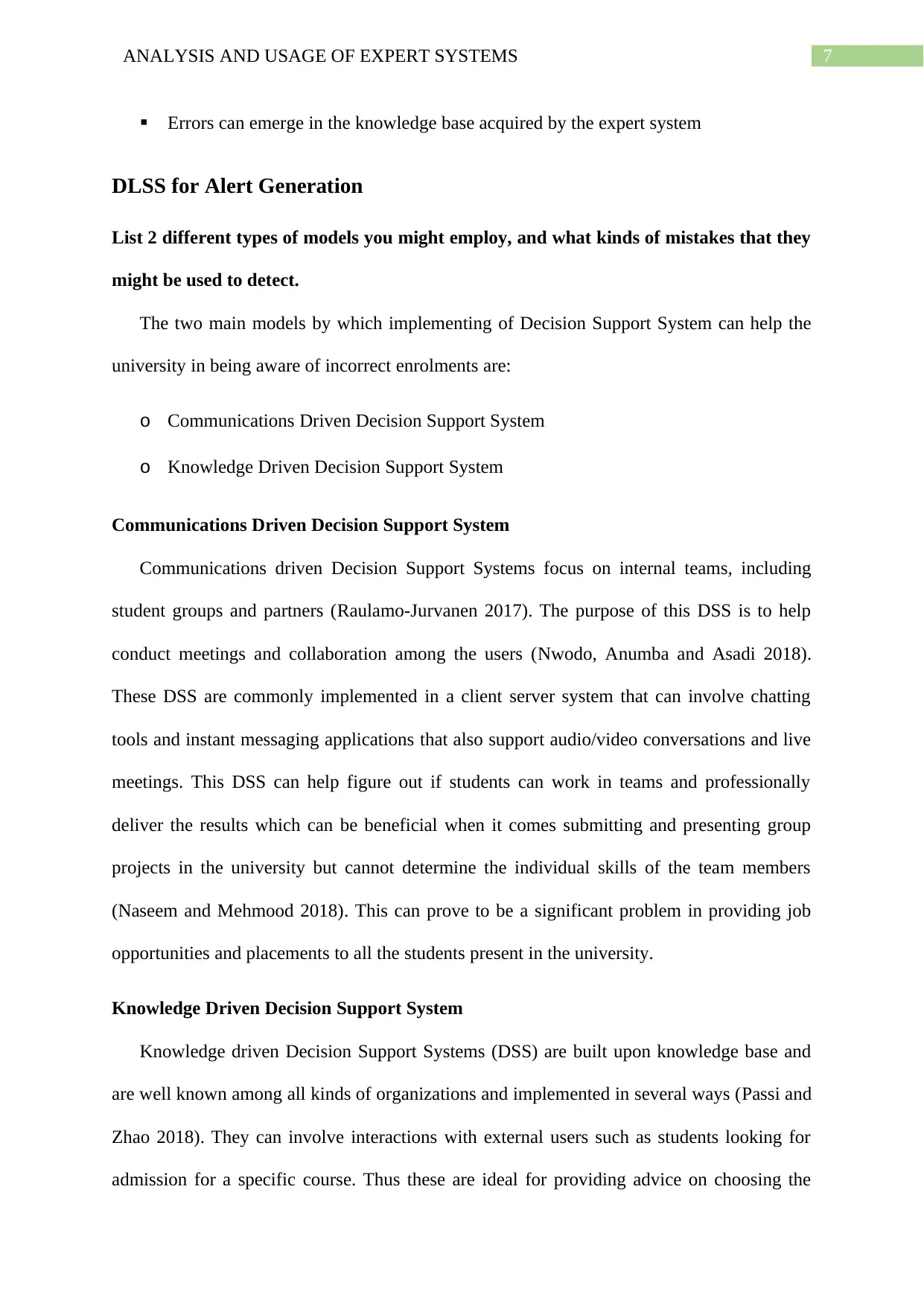
7ANALYSIS AND USAGE OF EXPERT SYSTEMS
Errors can emerge in the knowledge base acquired by the expert system
DLSS for Alert Generation
List 2 different types of models you might employ, and what kinds of mistakes that they
might be used to detect.
The two main models by which implementing of Decision Support System can help the
university in being aware of incorrect enrolments are:
o Communications Driven Decision Support System
o Knowledge Driven Decision Support System
Communications Driven Decision Support System
Communications driven Decision Support Systems focus on internal teams, including
student groups and partners (Raulamo-Jurvanen 2017). The purpose of this DSS is to help
conduct meetings and collaboration among the users (Nwodo, Anumba and Asadi 2018).
These DSS are commonly implemented in a client server system that can involve chatting
tools and instant messaging applications that also support audio/video conversations and live
meetings. This DSS can help figure out if students can work in teams and professionally
deliver the results which can be beneficial when it comes submitting and presenting group
projects in the university but cannot determine the individual skills of the team members
(Naseem and Mehmood 2018). This can prove to be a significant problem in providing job
opportunities and placements to all the students present in the university.
Knowledge Driven Decision Support System
Knowledge driven Decision Support Systems (DSS) are built upon knowledge base and
are well known among all kinds of organizations and implemented in several ways (Passi and
Zhao 2018). They can involve interactions with external users such as students looking for
admission for a specific course. Thus these are ideal for providing advice on choosing the
Errors can emerge in the knowledge base acquired by the expert system
DLSS for Alert Generation
List 2 different types of models you might employ, and what kinds of mistakes that they
might be used to detect.
The two main models by which implementing of Decision Support System can help the
university in being aware of incorrect enrolments are:
o Communications Driven Decision Support System
o Knowledge Driven Decision Support System
Communications Driven Decision Support System
Communications driven Decision Support Systems focus on internal teams, including
student groups and partners (Raulamo-Jurvanen 2017). The purpose of this DSS is to help
conduct meetings and collaboration among the users (Nwodo, Anumba and Asadi 2018).
These DSS are commonly implemented in a client server system that can involve chatting
tools and instant messaging applications that also support audio/video conversations and live
meetings. This DSS can help figure out if students can work in teams and professionally
deliver the results which can be beneficial when it comes submitting and presenting group
projects in the university but cannot determine the individual skills of the team members
(Naseem and Mehmood 2018). This can prove to be a significant problem in providing job
opportunities and placements to all the students present in the university.
Knowledge Driven Decision Support System
Knowledge driven Decision Support Systems (DSS) are built upon knowledge base and
are well known among all kinds of organizations and implemented in several ways (Passi and
Zhao 2018). They can involve interactions with external users such as students looking for
admission for a specific course. Thus these are ideal for providing advice on choosing the

8ANALYSIS AND USAGE OF EXPERT SYSTEMS
right service among the ones offered by an organization. This kind of DSS cannot ensure how
successful the students can be in job environments after they graduate from the university as
job require team work, communications and professionalism which are not considered when
expert systems recommend courses to students.
right service among the ones offered by an organization. This kind of DSS cannot ensure how
successful the students can be in job environments after they graduate from the university as
job require team work, communications and professionalism which are not considered when
expert systems recommend courses to students.
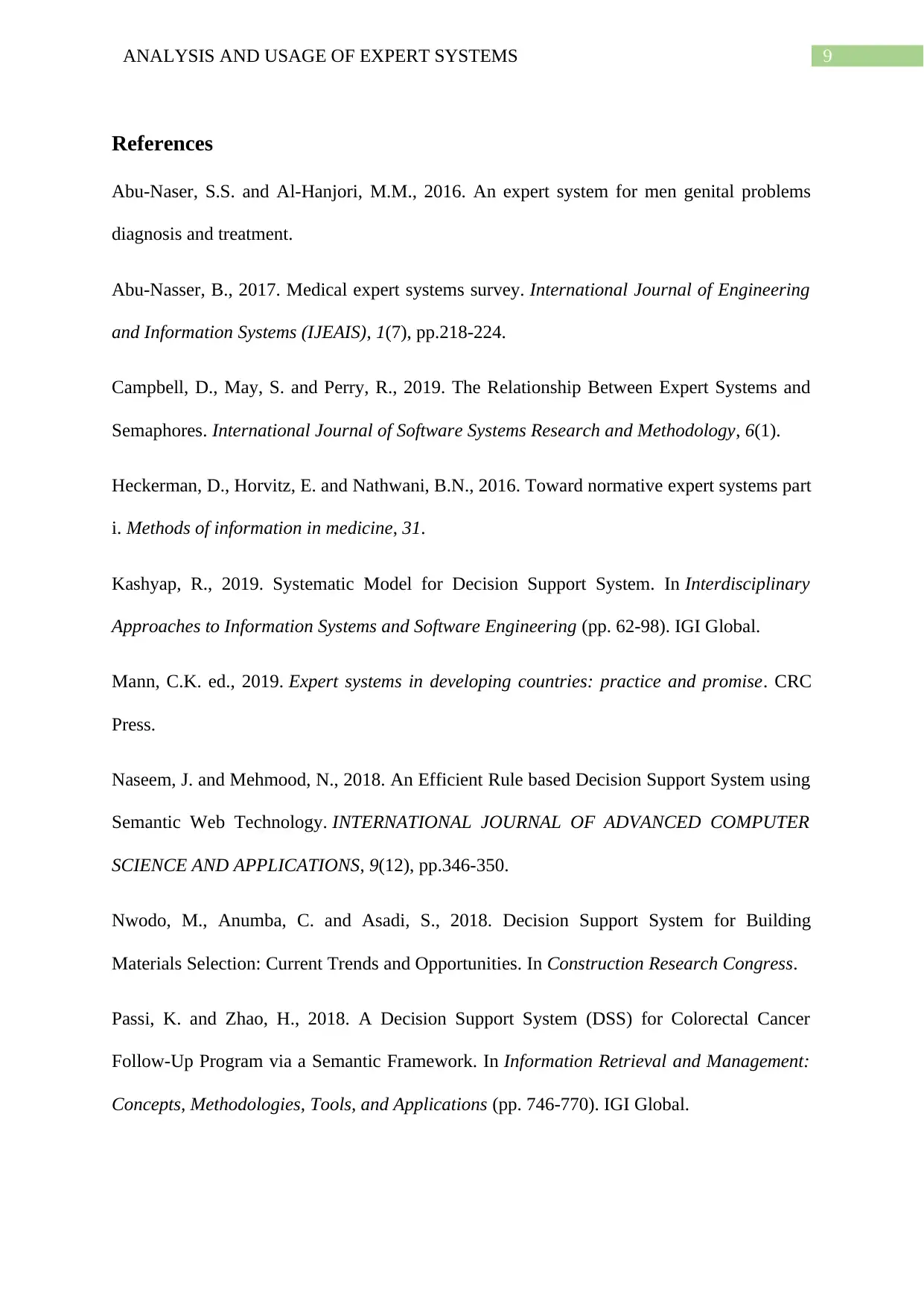
9ANALYSIS AND USAGE OF EXPERT SYSTEMS
References
Abu-Naser, S.S. and Al-Hanjori, M.M., 2016. An expert system for men genital problems
diagnosis and treatment.
Abu-Nasser, B., 2017. Medical expert systems survey. International Journal of Engineering
and Information Systems (IJEAIS), 1(7), pp.218-224.
Campbell, D., May, S. and Perry, R., 2019. The Relationship Between Expert Systems and
Semaphores. International Journal of Software Systems Research and Methodology, 6(1).
Heckerman, D., Horvitz, E. and Nathwani, B.N., 2016. Toward normative expert systems part
i. Methods of information in medicine, 31.
Kashyap, R., 2019. Systematic Model for Decision Support System. In Interdisciplinary
Approaches to Information Systems and Software Engineering (pp. 62-98). IGI Global.
Mann, C.K. ed., 2019. Expert systems in developing countries: practice and promise. CRC
Press.
Naseem, J. and Mehmood, N., 2018. An Efficient Rule based Decision Support System using
Semantic Web Technology. INTERNATIONAL JOURNAL OF ADVANCED COMPUTER
SCIENCE AND APPLICATIONS, 9(12), pp.346-350.
Nwodo, M., Anumba, C. and Asadi, S., 2018. Decision Support System for Building
Materials Selection: Current Trends and Opportunities. In Construction Research Congress.
Passi, K. and Zhao, H., 2018. A Decision Support System (DSS) for Colorectal Cancer
Follow-Up Program via a Semantic Framework. In Information Retrieval and Management:
Concepts, Methodologies, Tools, and Applications (pp. 746-770). IGI Global.
References
Abu-Naser, S.S. and Al-Hanjori, M.M., 2016. An expert system for men genital problems
diagnosis and treatment.
Abu-Nasser, B., 2017. Medical expert systems survey. International Journal of Engineering
and Information Systems (IJEAIS), 1(7), pp.218-224.
Campbell, D., May, S. and Perry, R., 2019. The Relationship Between Expert Systems and
Semaphores. International Journal of Software Systems Research and Methodology, 6(1).
Heckerman, D., Horvitz, E. and Nathwani, B.N., 2016. Toward normative expert systems part
i. Methods of information in medicine, 31.
Kashyap, R., 2019. Systematic Model for Decision Support System. In Interdisciplinary
Approaches to Information Systems and Software Engineering (pp. 62-98). IGI Global.
Mann, C.K. ed., 2019. Expert systems in developing countries: practice and promise. CRC
Press.
Naseem, J. and Mehmood, N., 2018. An Efficient Rule based Decision Support System using
Semantic Web Technology. INTERNATIONAL JOURNAL OF ADVANCED COMPUTER
SCIENCE AND APPLICATIONS, 9(12), pp.346-350.
Nwodo, M., Anumba, C. and Asadi, S., 2018. Decision Support System for Building
Materials Selection: Current Trends and Opportunities. In Construction Research Congress.
Passi, K. and Zhao, H., 2018. A Decision Support System (DSS) for Colorectal Cancer
Follow-Up Program via a Semantic Framework. In Information Retrieval and Management:
Concepts, Methodologies, Tools, and Applications (pp. 746-770). IGI Global.
Secure Best Marks with AI Grader
Need help grading? Try our AI Grader for instant feedback on your assignments.
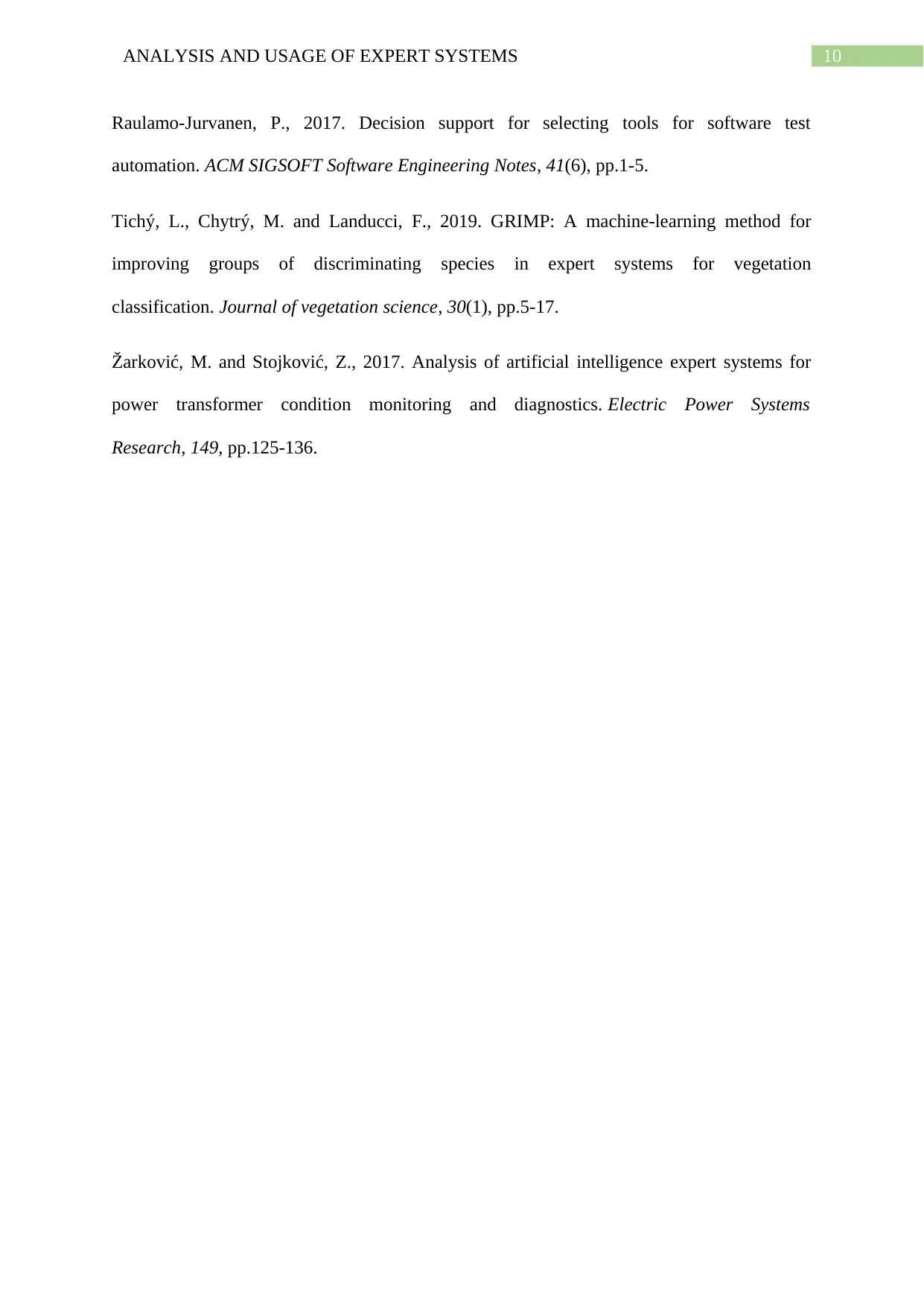
10ANALYSIS AND USAGE OF EXPERT SYSTEMS
Raulamo-Jurvanen, P., 2017. Decision support for selecting tools for software test
automation. ACM SIGSOFT Software Engineering Notes, 41(6), pp.1-5.
Tichý, L., Chytrý, M. and Landucci, F., 2019. GRIMP: A machine‐learning method for
improving groups of discriminating species in expert systems for vegetation
classification. Journal of vegetation science, 30(1), pp.5-17.
Žarković, M. and Stojković, Z., 2017. Analysis of artificial intelligence expert systems for
power transformer condition monitoring and diagnostics. Electric Power Systems
Research, 149, pp.125-136.
Raulamo-Jurvanen, P., 2017. Decision support for selecting tools for software test
automation. ACM SIGSOFT Software Engineering Notes, 41(6), pp.1-5.
Tichý, L., Chytrý, M. and Landucci, F., 2019. GRIMP: A machine‐learning method for
improving groups of discriminating species in expert systems for vegetation
classification. Journal of vegetation science, 30(1), pp.5-17.
Žarković, M. and Stojković, Z., 2017. Analysis of artificial intelligence expert systems for
power transformer condition monitoring and diagnostics. Electric Power Systems
Research, 149, pp.125-136.
1 out of 11
Your All-in-One AI-Powered Toolkit for Academic Success.
+13062052269
info@desklib.com
Available 24*7 on WhatsApp / Email
![[object Object]](/_next/static/media/star-bottom.7253800d.svg)
Unlock your academic potential
© 2024 | Zucol Services PVT LTD | All rights reserved.



